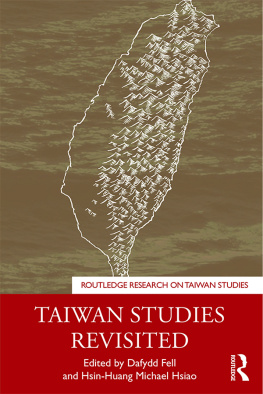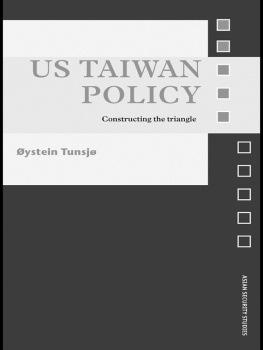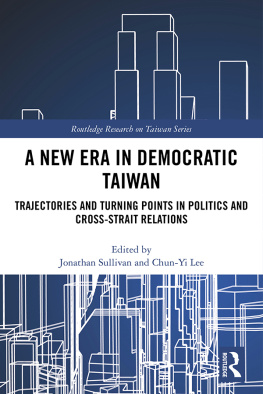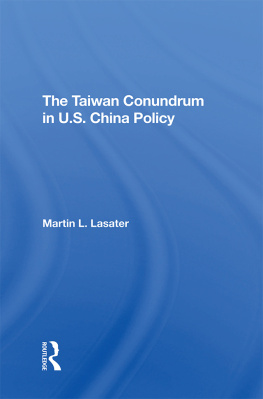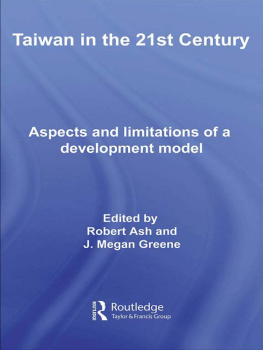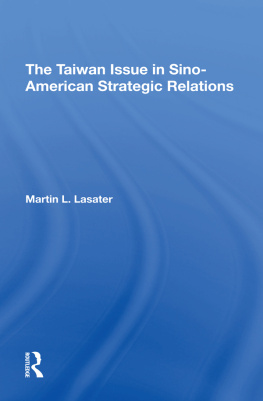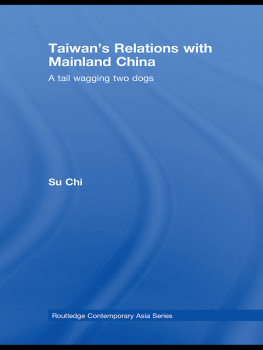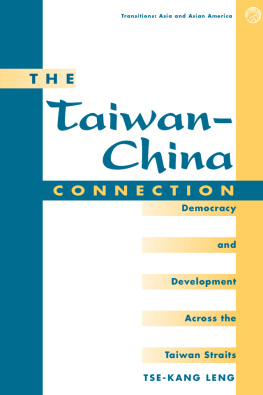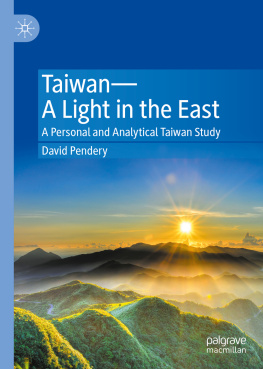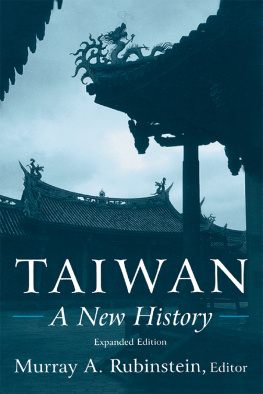TAIWAN
Beyond the Economic Miracle
TAIWAN IN THE MODERN WORLD
Taiwan
Beyond the Economic Miracle
Tzong-Ho Bau
Richard C. Bush III
Parris H. Chang
Pei-chen Chang
Raymond J. M. Chang
Yung-mau Chao
Hill Gates
Hsin-Huang Michael Hsiao
Marshall Johnson
Michael Y. M. Kau
Donald W. Klein
Chi Schive
Thomas W. Robinson
Denis Fred Simon
Alden Speare, Jr.
Hung-mao Tien
Jack F. Williams
Edwin A. Winckler
Denis Fred Simon
and
Michael Y. M. Kau
Editors
An East Gate Book
An East Gate Book
First published 1992
by M.E. Sharpe
Published 2015
by Routledge
2 Park Square, Milton Park, Abingdon, Oxon OX14 4RN
711 Third Avenue, New York, NY 10017, USA
Routledge is an imprint of the Taylor & Francis Group, an informa business
Copyright 1992 Taylor & Francis. All rights reserved.
No part of this book may be reprinted or reproduced or utilised in any form or by any electronic, mechanical, or other means, now known or hereafter invented, including photocopying and recording, or in any information storage or retrieval system, without permission in writing from the publishers.
Notices
No responsibility is assumed by the publisher for any injury and/or damage to persons or property as a matter of products liability, negligence or otherwise, or from any use of operation of any methods, products, instructions or ideas contained in the material herein.
Practitioners and researchers must always rely on their own experience and knowledge in evaluating and using any information, methods, compounds, or experiments described herein. In using such information or methods they should be mindful of their own safety and the safety of others, including parties for whom they have a professional responsibility.
Product or corporate names may be trademarks or registered trademarks, and are used only for identification and explanation without intent to infringe.
Library of Congress Cataloging-in-Publication Data
Taiwan: beyond the economic miracle /
edited by Denis Fred Simon and Michael Y.M. Kau.
p. cm.(Taiwan in the modern world)
"An East Gate book."
Papers from a conference held December 1989 at
Fletcher School of Law and Diplomacy of Tufts University.
Includes index.
ISBN 0-87332-879-5 HardcoverISBN 1-56324-215-X Paper
1. TaiwanEconomic conditions1975 Congresses.
2. TaiwanPolitics and government1975 Congresses.
3. TaiwanRelationsChinaCongresses.
4. ChinaRelationsTaiwanCongresses.
I. Simon, Denis Fred.
II. Kau, Michael Y.M., 1934.
III. Fletcher School of Law and Diplomacy.
IV. Series.
HC430.5T233 1991
330.95124'905dc20
91-28561
CIP
ISBN 13: 9781563242151 (pbk)
ISBN 13: 9780873328791 (hbk)
Contents
| Denis Fred Simon and Michael Ying-mao Kau |
| Hung-mao Tien |
| Parris H. Chang |
| Yung-mau Chao |
| Marshall Johnson |
| Chi Schive |
| Denis Fred Simon |
| Hsin-Huang Michael Hsiao |
| Hill Gates |
| Jack F. Williams |
| Alden Speare, Jr. |
| Michael Ying-mao Kau |
| Donald W. Klein |
| Raymond J.M. Chang |
| Pei-chen Chang |
| Tzong-Ho Bau |
| Edwin A. Winckler |
| Richard C. Bush III |
| Thomas W. Robinson |
Organizing a major conference and arranging for the publication of the conference papers are tasks that could not possibly be accomplished by one or two individuals alone, no matter how resourceful they might be. Accordingly, as the editors of this volume, we would like to express our sincere appreciation to Dr. Yu-ming Shaw, who, in helping us to mobilize the necessary resources and key persons, allowed us to forge ahead with the idea of holding the conference from which these papers derive. We also want to express our gratitude to the Twenty-first Century Foundation on Taiwan for its generous support to hold this conference. We would also like to thank the Asia-Pacific Educational Fund, which helped support the publication of this book. In addition, special thanks are due to Karin McMaster, Jessica Daniels, and Laura Conti of the Fletcher School of Law and Diplomacy at Tufts University, all of whom provided assistance beyond the call of duty to make the conference and this book a reality. Finally, our thanks go to the editorial staff at M.E. Sharpe, who has spent many hours working with the respective authors in this volume.
Denis Fred Simon, Tufts University Michael Ying-mao Kau, Brown University
Denis Fred Simon and Michael Ying-mao Kau
The death of Chiang Ching-kuo in 1987 along with the onset of the 1990s has afforded Taiwan a rare opportunity to look back on its achievements of the past four decades and to begin the process of preparing for the challenges of the twenty-first century. There is little doubt that Taiwan has made remarkable economic gains since the 1950s, when the Kuomintang (KMT) regime began to focus its attention on developing the island to which it had retreated after the Communist takeover on the Chinese mainland. In fact, Taiwan's so-called economic miracle has been closely studied by many countries in the Third World, especially in terms of its relevance as a model of export-led development. In addition, Taiwan's achievements in terms of attaining a relatively equitable distribution of income in the midst of rapid economic growth have made it an exemplar as many developing countries struggle with ensuring that the benefits of their development are shared by a large proportion of their respective populations.
Along with those studies attesting to Taiwan's economic success, there are now an increasing number of books and articles highlighting Taiwan's achievements in the political realm. Although Taiwan's progress in terms of political development has not been as consistently reported, few can deny the degree to which fundamental changes have taken place in the nature of political discourse and the conduct of political activity since the mid-1980s. Very few observers abroad would have thought it possible for Taiwan to move as rapidly as it has toward the process of democratization. And, while there are still major issues outstanding regarding the nature of Taiwan's constitutional structure and evolving political parties as well as the relationship between local and so-called national politics, the reality is that reform of the entire political system has acquired a momentum that cannot be stopped.
Interestingly, however, Taiwan is now faced with the challenge of confronting the consequences of its own success. It must now begin to look beyond its past and focus on its future economic and political trajectory. High levels of economic prosperity in the past have clearly created expectations for the future. Similarly, the move toward the establishment of a workable democracy has raised expectations, though there remain substantial divisions over what form the future structure and operation of the political system will take. To complicate matters even further, the expansive world economic system, which proved so conducive to Taiwan's economic development in the past, is undergoing a major transformation, one that will pose new dilemmas for Taiwan's economic leaders as they seek to restructure the local economy to make it more competitive. The dynamics of world politics have also changed; the end of the Cold War, manifested most clearly in the changing relationship among the three superpowersthe United States, the USSR, and Chinahas further reduced the efficacy of the anticommunist posture that afforded Taiwan a security umbrellaimplicit and explicitfor four decades. When these external economic and political changes are combined with the sizable changes that have occurred in global technology and financial affairs, it is clear that Taiwan is confronted with a difficult road as it begins the task of repositioning itself and redefining its future directions.


